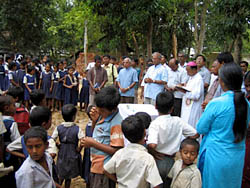 【慈幼通訊社
─ 2009 年 9 月 2 日孟加拉 Utrail 訊】
─
在第二十六屆鮑思高慈幼會全會代表大會結束禮中,總會長查偉思神父曾以堅決的姿態宣佈,慈幼會將會前往全球最貧困國家之一的孟加拉服務,標誌著修會服務展開新紀元。一年後,這個許諾得以實現。二零零九年三月二十四日,慈幼會士來到孟加拉,創立在當地的首項事業。
【慈幼通訊社
─ 2009 年 9 月 2 日孟加拉 Utrail 訊】
─
在第二十六屆鮑思高慈幼會全會代表大會結束禮中,總會長查偉思神父曾以堅決的姿態宣佈,慈幼會將會前往全球最貧困國家之一的孟加拉服務,標誌著修會服務展開新紀元。一年後,這個許諾得以實現。二零零九年三月二十四日,慈幼會士來到孟加拉,創立在當地的首項事業。
自一九二八年起,慈幼會士已在當時隸屬印度克里希納納加教區的 Jessore 和庫爾納地區服務。一九四七年印度分裂,成立了東巴基斯坦後,會士繼續於當地工作,直至一九五二年。及後慈幼撤離,轉到Bengal屬印度管轄的地區服務,當地的牧民工作則交給聖方濟各沙勿略傳教修會。
一九七一年,東巴基斯坦成為獨立國家,改名為「孟加拉」。如今第一批慈幼會士來到當地,正好回應了當地主教對慈幼會士的渴求,同時標誌著宗徒事業的新領域,以配合慈幼會於本年十二月十八日,慶祝創會一百五十週年。
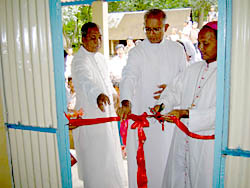 這項新傳教使命所面臨的挑戰確實不少。總括來說,在現今的世代,尤其是在濃厚伊斯蘭氣氛的環境中,都帶來很多挑戰。正是這樣,孟加拉成為慈幼會士一個新領域。
這項新傳教使命所面臨的挑戰確實不少。總括來說,在現今的世代,尤其是在濃厚伊斯蘭氣氛的環境中,都帶來很多挑戰。正是這樣,孟加拉成為慈幼會士一個新領域。
以宗教信仰劃分,孟加拉人口百分之八十七為伊斯蘭教信徒。當地不乏激進分子,矢志把伊斯蘭教教法在全國推廣。國內印度教徒佔百分之十以上,餘下百分之三的人口中,包括了佔人口不足百分之零點三五的基督徒。基督徒在全國一億五千萬人口中,不足三十萬。
在這樣的環境下,傳教工作極需營造宗教交談的氛圍,同時也需重新向已領洗的教友福傳,因為教友的基督徒生活質素,需要一個較大的進步。
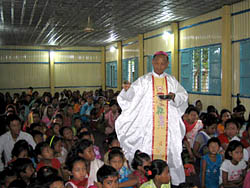 以種族劃分,當地人口百分之九十七為孟加拉裔。其餘人口涵蓋不同種族,包括印度的一些原居部族。這些部族在一定程度上,受國內主要族裔人口剝削,逐漸被邊緣化。他們不像國內其他人,有著同等的發展機會,自我形象也較低落。
以種族劃分,當地人口百分之九十七為孟加拉裔。其餘人口涵蓋不同種族,包括印度的一些原居部族。這些部族在一定程度上,受國內主要族裔人口剝削,逐漸被邊緣化。他們不像國內其他人,有著同等的發展機會,自我形象也較低落。
對於孟加拉國內大部份人口來說,貧窮悲慘的狀況,是殘酷的事實。官方的統計數據顯示,平均每人每日收入介乎一點五至三歐羅。不斷發生的自然災害,造成了人們的苦況。國家財政儲備的缺乏,也使人們無力救濟這些災難帶來的損失。
人民知識水平低落,加上缺乏良好教育設施,為國內大部份人口,尤其是經濟環境差劣的一群,帶來不穩定因素。
在這個情況下,慈幼會士可提供很大程度的援助,這是因為福傳與教育,為慈幼神恩兩大相連的支柱特質。我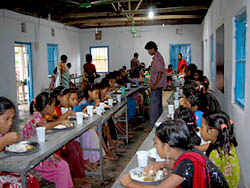 們來到這個國家,為一般青少年及窮人帶來一個更美好將來的願景,以基督徒生活的觀點來說,這更充滿了人性。
們來到這個國家,為一般青少年及窮人帶來一個更美好將來的願景,以基督徒生活的觀點來說,這更充滿了人性。
首批傳教士於邁門辛教區的 Utrail 服務。Utrail 在內德羅戈納行政區內,位於邁門辛市區以北五十五公里。內德羅戈納為孟加拉一個極需開發的地區。由於連年的水災,當地很多橋樑被沖毀,以致往來邁門辛及 Utrail 的行程,需花上數小時,且是極需耐性的艱險旅程。
目前慈幼會事業的主要受益者為 Mandi (Garo) 族,以及當地的所有貧苦青少年。數個月後,Mandi 部族地區一帶新成立的堂區,將交給我們管理。我們目前正致力牧民工作,重點為向教友推行新福傳,並協助他們「裝備」自己,應付社會生活。
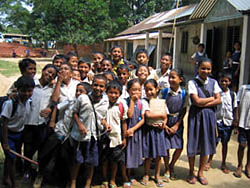 教區把一所以聖方濟各沙勿略命名的免費小學,交給我們管理。二百七十名來自基督宗教、印度教及伊斯蘭教家庭的學生,來這裡就讀。我們盡一切努力,提升學校的質素,首要是改善校舍設施。我們計劃透過不同的貧苦青少年教育方案,改善少數族裔及窮人的社會地位,使他們與普羅社會看齊。為此,我們仍在物色一片更大的土地。這確是宏大的夢想,然而作為偉大夢想家的神子,藉著天主的扶助及瑪利亞進教之佑的轉求,這夢想終有一天會實現的。
教區把一所以聖方濟各沙勿略命名的免費小學,交給我們管理。二百七十名來自基督宗教、印度教及伊斯蘭教家庭的學生,來這裡就讀。我們盡一切努力,提升學校的質素,首要是改善校舍設施。我們計劃透過不同的貧苦青少年教育方案,改善少數族裔及窮人的社會地位,使他們與普羅社會看齊。為此,我們仍在物色一片更大的土地。這確是宏大的夢想,然而作為偉大夢想家的神子,藉著天主的扶助及瑪利亞進教之佑的轉求,這夢想終有一天會實現的。
The New Salesian Presence
(ANS – Bangladesh - Utrail, 2 September 2009 ) – At the conclusion of the 26th General Chapter of the Salesians of Don Bosco, the Rector Major, Fr Pascual Chavez announced that as a concrete expression of the commitment of the congregation to open new frontiers, the Salesians would go to work in Bangladesh, one of the poorest countries in the world. One year later this promise has become reality. From 24 March 2009 the Salesians are present in Bangladesh and are already in the act of establishing their first presence in this country.
From 1928 the Salesians were working in the districts of Jessore and Khulna, then part of the diocese of Krishnagar. After the partition of India and the creation of East Pakistan in 1947, they continued to work in these places till 1952. Then they withdrew to the Indian part of Bengal, entrusting the pastoral work to the care of the missionaries of St Francis Xavier (the Xavarians).
In 1971 East Pakistan became an independent country and was renamed “Bangladesh”. The opening of the first Salesian presence in this country is at the same time an answer to the repeated requests of the Bishops for the presence of the Salesians as well as the launching of a new apostolic frontier on the occasion of the 150th anniversary of the founding of the Salesian Society which occurs on 18 December 2009.
The challenges that this new mission presents are indeed many. In summary, they are the challenges of evangelization in the modern context and more specifically in a strongly Muslim environment. Precisely because of this Bangladesh becomes a new frontier for the Salesians.
As far as religion is concerned, 87% of the population of this country is Muslim. Among them there is no lack of extremists who are keen on introducing the Sharia in the whole country. The Hindus are some 10%. In the remaining 3% are included also the Christians who hardly reach 0.35% of the total. The Catholics are hardly 300,000 in a population of 150 million.
In such a context evangelization requires a serious commitment to inter-religious dialogue as well as attention to the renewed evangelization of those already baptized because the Christian life of the faithful is in need of a great leap in quality.
From the social point of view, 97% of the population is Bengali. The rest are composed of different ethnic minorities and indigenous tribes which can be found also in India. These tribes are being increasingly marginalised and in a certain sense much exploited by the majority population. They do not have the same opportunities for development and self affirmation like the others.
The phenomenon of poverty and misery is a stark reality for the vast majority of the population of Bangladesh. Official statistics notwithstanding, the daily income of a good percentage of people is between 1.5 and 3 Euros. Periodic natural calamities compound the problems of misery. The absence of economic reserves makes the people incapable of repairing the losses caused by these disasters.
Illiteracy and inaccessibility to a good education complete the precarious social condition of the majority of the population in this country, and in particular of the economic minorities.
In this situation the Salesians have much to offer precisely because evangelization and education are the two interconnected poles of the Salesian charism. We have come to this country to offer the young people and the poor in general the hope of a better tomorrow that is more human according to the Christian vision of life.
The first Salesian presence is at Utrail in the diocese of Mymensingh. It is situated in the Netrokona civil district, 55 KM to the north of the city of Mymensingh. Netrokona is one of the more underdeveloped districts in Bangladesh. Because of the lack of some bridges which were washed away over the years in successive floods, the journey between Mymensingh and Utrail is a true adventure of patience and hardships lasting several hours.
At present the principal beneficiaries of the Salesian mission are the ethnic group called Mandi (Garo) and the poor children and youth of all the groups in the region. In a few months’ time a new parish among the Mandi will be entrusted to us. We are now engaged in pastoral work with the accent on new evangelization and the social “empowerment” of the faithful.
The diocese has handed over to us a free primary school named after St Francis Xavier. 270 poor children from Christian, Hindu and Muslim families attend this school. Every effort is being made to upgrade the standard of this school. The very first requirement for this is a proper school building. Through various educational initiatives for the poor children and the youth we have a plan to improve the overall social standing of the minorities and of the poor, in order to bring them on a par with the others. For this purpose we are still in search of a large piece of land. This is indeed a very ambitious dream, but for the sons of a great dreamer, with the help of God and the intercession of Mary Help of Christians, this dream will become reality day by day.